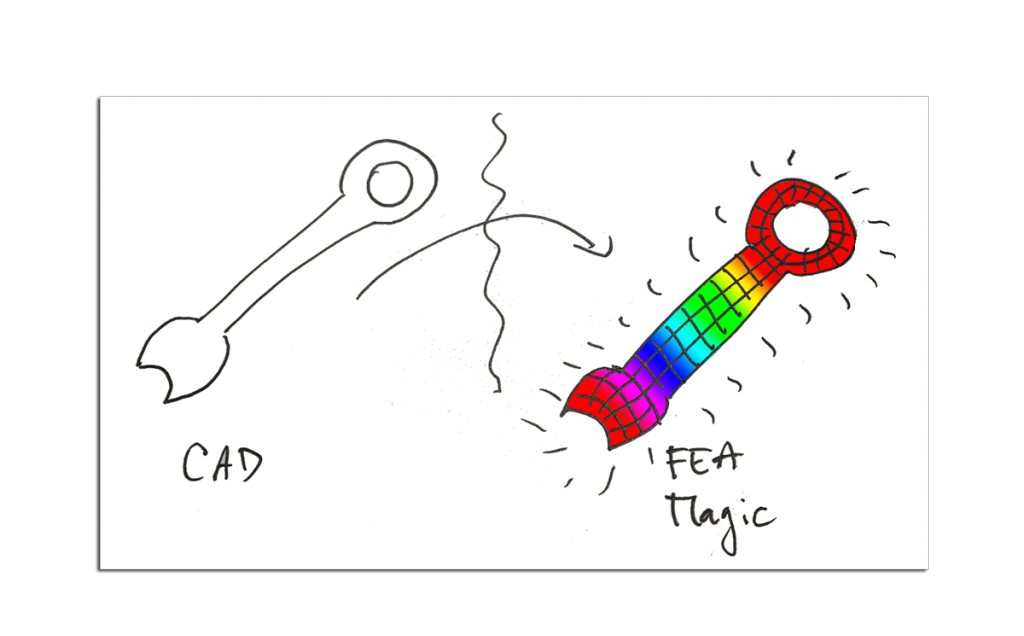Do you know what is the best way to recognize someone without any experience in FEA?
Just ask him the question « What’s the best FEA software? » and listen to his answer
If he answers with the name of one software and genuinely believe that it is the best then you know you just spotted a beginner
(Or a dishonest software salesman, which is much worse ;-) )
Why is that?
Because my question is very generic, and can’t really be answered without provided much details
- What do I mean by « Best »?
- Best for what? which application?
- Best to achieve what? Design of a product? Detail Simulation of a product’s physical behaviour? Or just best for generating fancy pictures?
- Or best because you just have to click on 3 buttons to get fancy colorful pictures?
There is no “FEA Magic” ;-)

If you are an engineer, you need to “critical think” !
You need to think deeply about things, and not just stay at the shallow level of the surface of things.
There is no tool « Good for Everything » as many would like you to believe
A software is generally develop to accomplish a specific task:
- Solve some type of physical equations
- Special types of applications
- Get some specific types of results
- Work better with some types of geometries
It is true that some software have become more and more generalistic by integrating more and more features…
But the purpose of one engineer is always to solve one specific problem!
(The first step to solve a problem is always to lay it down on paper and get to the specific details of it to understand the roadblocks)
If your tool is too generic, doesn’t it defeat the purpose it was originally built to accomplish?

That’s why you can sometimes stay in awe in front of the shear amount of stuff one tool can accoplish.
But it then leads to he following question:
Is it really better and more useful to you that one software has 1000 features and in those, you will only ever use 5 of them?

Moreover, to be able to use hose 5 features, you will have to learn 500 features first and get 3 years trainings.
I am exaggerating slightly, but I am sure that you get my point.
You don’t need to have a Swiss knife to cut a piece of wood, you just need a good knife.
(A small swiss knife will probably even make it more difficult for you)
Ok, now that you understand why I am criticising this honest but simplistic question « what is the best software »
I think that you understand that the answer is simply… no software is really the best for everything.
If you get very precise about the application you want to solve and the kind of results you want to obtain, then yes, you might get very precise requirements and find a software probably developed just for you that you might call best!

(Or develop your own)
But such situation is rare…
So, what should you do?
Not worry about using the best software and just accept the first cheap tool you can find?
Of course not!
There are several solutions that I think are MUCH better:
- Learn the physics and what’s behind the software rather than just the software usage… Understand the system and you will never be a pawn of software companies*
- Learn to use and understand all the tools that you will ever need. Build a toolbox of useful stuff that will help you during your engineering journey, don’t rely one one tool. (don’t put all the eggs in one basket)
- learn to develop and build your own tools
We all really need to separate ourselves from the FEA software we use to look at more ways to engineer and create innovative systems!
Is this significantly harder than just learning one software and getting stuck with it?
Yes
Is it worth it?
Double Yes.
Should you do it?
Hell Yes!
Remember that my philosophy is always to choose the harder path. The path of learning.
–Cyprien “Getting out of the beginner mindset” Rusu

*PS: You have to learn anyway the physics to use correctly an FEA software!
**PS2: Another way to recognize someone without much experience:

excellent post !
This is a post which would help beginners to refrain from “clickosophy” and try to look at FEA as a tool to understand physical behaviour of (engineering) systems..
Nice reading. I will recommend it to some of my students..
Thank you Cyprien
Excellent post my friend.. Grettings from Venezuela!
Love your writing style and learning philosofy. Thank you for that!
Really cool post! I’m asking similar questions on the interview with potential new employees. Believe me, I met a lot of people legitimate in their CV to have reach experience in FEA. Though when you start talking and ask them silly questions like what is FEM? What for and why they would use FEA? What software is the best one? Often interviewer starting realize that those people from their 15years of FEA experience the only first 3years were really working with FEM the other number of years, they were presenting the results that others were generated. And because of this, they are kind of detached from FEA… They’ve become rookies after all of these years… And often you see irritation some dose of frustration on their faces and in the way, they speaking (strat becoming a bit aggressive which is normal for not flexible people), then it is obvious that you don’t want to work with such units. I found your article very great, it shows how simple questions are powerful, without any doubt asking them can show if a person is a beginner but also what character given person has…which is even more important
Thanks for this comment, Mirek!
It surprises me that people with 15+ years of experience still can’t answer such questions… but I met a few people who were like you describe too. I guess that when you work for a big company, the interns do the real work and the older guys just take the results and the reports and make others believe this is their own work. Easy to spot those guys though when you are a real expert ;-) A few simple questions are enough.